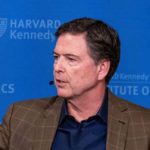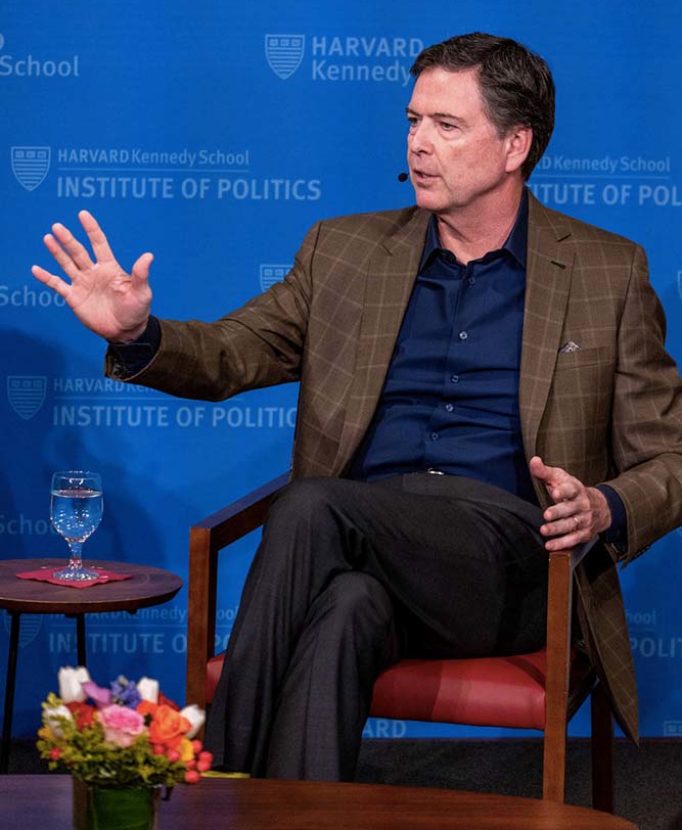-
The Shadow War: Russia and China Inside the United States
The threat from America’s main adversaries has two dimensions, only one of which is well known. We all know the threat Russia poses with its invasion of Ukraine, nuclear saber-rattling, and use of energy as a weapon. We know of China’s ambitions in the South China Sea, its menacing of Taiwan, and its efforts to build a military that rivals America’s. But we know far less about the threat inside the United States, which is the responsibility of the FBI. The Bureau is charged with understanding the danger those two very different adversaries pose within this country and neutralizing them.
As Director of the FBI, James Comey woke up every day worrying about it. Protecting America’s government secrets, its private sector intellectual property, and public and private critical infrastructure requires enormous resources and agility — because the threat comes at American institutions and companies through both old-fashioned human intelligence spies and sophisticated cyber security intrusions. A spell-binding story teller, Comey will inform and entertain any audience with tales of the successes, failures, and future direction of the twilight counter-intelligence battle against America’s enemies .
-
Justice As It Must Be: Protecting American Democracy and Institutions from Partisanship
For centuries, Lady Justice has been depicted wearing a blindfold because she seeks only to weigh the facts, and find the truth, without regard to the people before her. The Constitution gave federal judges jobs for life to protect them from any political pressure to lift the blindfold. The Department of Justice was built around the notion that federal prosecutors and their agents at the FBI are, as the Supreme Court has explained, representing an idea — justice — not an ordinary client.
There is a lot wrong with justice in America. But one of the things that has been right is the reality and reputation built by the United States Department of Justice over generations. Across those decades, and especially in the fifty years since Watergate, Justice employees — which includes the FBI — came to be seen as a people apart — still flawed in all the ways humans are flawed, but somehow different and trustworthy. They could be trusted to sort out the most difficult situations, to investigate politicians, to wade into painful racial strife, to find and tell the American people the truth.
If we are to be a healthy nation, it must stay that way. Using gripping stories from his decades of work in the Justice Department and the FBI, James Comey will remind audiences how the institutions of justice should work, through both Republican and Democratic administrations. His stories show that truth is real and it must be sought and spoken — in courtrooms, conference rooms, and investigative interviews—without regard to privilege, connection, or partisan allegiance. Comey speaks to ordinary citizens, not legal experts or historians, because all of us must know the Justice Department, especially now, as it is again thrust into the national spotlight.
-
The Center Holds: James Comey on America’s Shared Values and Finding Common Ground
America has long been a country of consensus. Historically, most citizens classified themselves at the ideological center – as moderates, with a balanced view on big issues. But today political and cultural tensions feel more pronounced, with a vast and growing gap between Democrats and Republicans. We are often told that the bell-shaped curve of our politics is morphing into two separated and angry lumps. And we’re afraid to talk about it – how we got here and what we should do to move forward. We avoid it at home and work, so as not to provoke anyone.
In this presentation, former FBI Director James Comey – who served under five Presidents from both sides of the aisle – argues that the center holds. We have much more in common than we realize, he says, especially when it comes to our deeply-held values. Having withstood partisan fire from all directions throughout his career, Comey knows how to turn tough conversations into positive dialogue so our country can begin healing. “I’ve long believed that it’s hard to hate up close,” says Comey. By standing on common ground, he says, we can wrestle with hard issues while not losing what unites us. Inspired by what we share, we can talk politics at the dinner table, to better understand our unique perspectives.
Delivered by one of the most effective, engaging communicators in public life today, Comey’s talk is optimistic and deeply informed. Touching on our shared values, and hidden consensus on issues portrayed as the source of bitter division, he reveals our often-overlooked commonalities. Telling stories drawn from his own life and leadership, Comey – a non-politician – explores issues like gun control, immigration policy, and LGBTQ rights to demonstrate that we are not a country torn by unbridgeable partisan division. Instead, he shows, we can talk with each other, as neighbors, friends, and fellow Americans – even when it comes to tough topics.
Wherever our politics takes us, leading up to the 2024 election and beyond, there is no doubt we need to reframe our differences in a healthier way. Grounded and genuine, Comey shares how to begin that healing process, from the center. We are better than the polarization we’re experiencing, he says. “And it’s up to us to fix it – and no one else.”
Through his experiences gained at the frontlines of policy and leadership, he shares how we can bridge the divide and come together to work toward a better collective future. Providing a winning formula for achieving common ground, Comey proves we can engage in tough conversations to inspire meaningful change – inviting questions from the audience about topics of interest.
-
The Ethical Leader
Throughout his decades-long career in public service, James Comey has been committed to doing the right thing—at the expense of partisan politics, popular opinion, and even personal friendships. His book, A Higher Loyalty: Truth, Lies, and Leadership, explores what good, ethical leadership looks like and how it drives sound decisions. He sheds light upon the thinking behind his own decisions and argues that leaders should be laser-focused on a core set of principles, chief among them truth, transparency, and decency. Comey offers executives—and the people who work for them—a road map for ethical leadership even in the most challenging and uncertain of circumstances.

